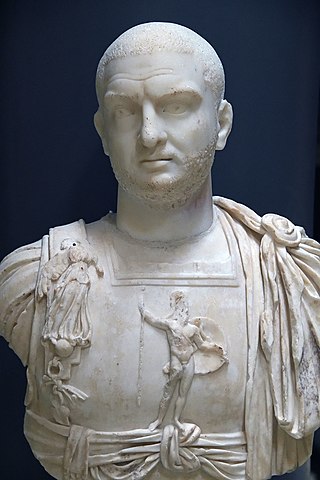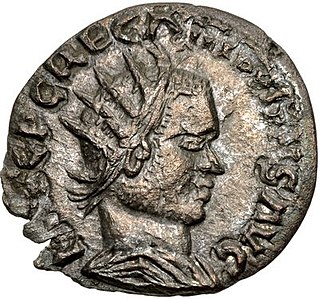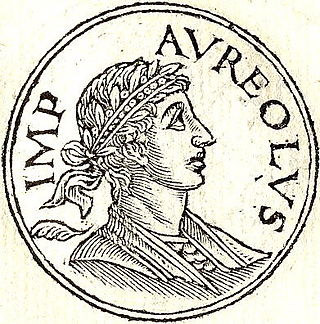
Publius Licinius Egnatius Gallienus was Roman emperor with his father Valerian from 253 to 260 and alone from 260 to 268. He ruled during the Crisis of the Third Century that nearly caused the collapse of the empire. He won numerous military victories against usurpers and Germanic tribes, but was unable to prevent the secession of important provinces. His 15-year reign was the longest in half a century.

Year 257 (CCLVII) was a common year starting on Thursday of the Julian calendar. At the time, it was known as the Year of the Consulship of Valerianus and Gallienus. The denomination 257 for this year has been used since the early medieval period, when the Anno Domini calendar era became the prevalent method in Europe for naming years.
The 250s was a decade that ran from January 1, 250, to December 31, 259.
The 260s decade ran from January 1, 260, to December 31, 269.
Year 258 (CCLVIII) was a common year starting on Friday of the Julian calendar. At the time, it was known as the Year of the Consulship of Tuscus and Bassus. The denomination 258 for this year has been used since the early medieval period, when the Anno Domini calendar era became the prevalent method in Europe for naming years.

Year 260 (CCLX) was a leap year starting on Sunday of the Julian calendar. At the time, it was known as the Year of the Consulship of Saecularis and Donatus. The denomination 260 for this year has been used since the early medieval period, when the Anno Domini calendar era became the prevalent method in Europe for naming years.

Valerian was Roman emperor from 253 to spring 260 AD. Valerian is known as the first Roman emperor to have been taken captive in battle, captured by the Persian emperor Shapur I after the Battle of Edessa, causing shock and instability throughout the Roman Empire. The unprecedented event and the unknown fate of the captured emperor generated a variety of different reactions and "new narratives about the Roman Empire in diverse contexts".

The Gallic Empire or the Gallic Roman Empire are names used in modern historiography for a breakaway part of the Roman Empire that functioned de facto as a separate state from 260 to 274. It originated during the Crisis of the Third Century, when a series of Roman military leaders and aristocrats declared themselves emperors and took control of Gaul and adjacent provinces without attempting to conquer Italy or otherwise seize the central Roman administrative apparatus.

Gaius Vibius Trebonianus Gallus was Roman emperor from June 251 to August 253, in a joint rule with his son Volusianus.

Marcus Cassianius Latinius Postumus was a Roman commander of Batavian origin, who ruled as emperor of the splinter state of the Roman Empire known to modern historians as the Gallic Empire. The Roman army in Gaul threw off its allegiance to Gallienus around the year 260, and Postumus assumed the title and powers of Emperor in the provinces of Gaul, Germania, Britannia, and Hispania. He ruled for the better part of ten years before he was murdered by his own troops.

Ingenuus was a Roman military commander, the imperial legate in Pannonia, who became a usurper to the throne of the emperor Gallienus when he led a brief and unsuccessful revolt in the year 260. Appointed by Gallienus himself, Ingenuus served him well by repulsing a Sarmatian invasion and securing the Pannonian border, at least temporarily. Ingenuus had also been charged with the military education of Caesar Cornelius Licinius Valerianus, the young son of Emperor Gallienus, but after the boy's death in 258, his position became perilous.

P. C. Regalianus, also known as Regalian, was Roman usurper for a few months in 260 and/or 261, during the Crisis of the Third Century, a period of intense political instability in the Roman Empire. Regalianus was acclaimed emperor by the troops along the Danube river, a region of the empire that frequently experienced barbarian raids, probably in the hope that he might be able to secure the frontier.

Aureolus was a Roman military commander during the reign of Emperor Gallienus before he attempted to usurp the Roman Empire. After turning against Gallienus, Aureolus was killed during the political turmoil that surrounded the Emperor's assassination in a conspiracy orchestrated by his senior officers. Aureolus is known as one of the Thirty Tyrants and is referenced in ancient sources including the Historia Augusta, Zonaras' epitome and Zosimus' Historia Nova.

The gens Licinia was a celebrated plebeian family at ancient Rome, which appears from the earliest days of the Republic until imperial times, and which eventually obtained the imperial dignity. The first of the gens to obtain the consulship was Gaius Licinius Calvus Stolo, who, as tribune of the plebs from 376 to 367 BC, prevented the election of any of the annual magistrates, until the patricians acquiesced to the passage of the lex Licinia Sextia, or Licinian Rogations. This law, named for Licinius and his colleague, Lucius Sextius, opened the consulship for the first time to the plebeians. Licinius himself was subsequently elected consul in 364 and 361 BC, and from this time, the Licinii became one of the most illustrious gentes in the Republic.

Publius Licinius Cornelius Saloninus Valerianus, typically just called Saloninus, was a Roman nobleman who briefly became emperor in 260. The grandson of Valerian I, Saloninus was appointed (subordinate) Caesar in 258 in an attempt to shore up the Licinial line of succession during the Crisis of the Third Century. During his time in power, Saloninus administered the German marches out of Cologne. Nevertheless, Saloninus soon became embroiled in a dispute with future Caesar of the Gallic Empire Postumus over war spoils. In 260, Saloninus' troops acclaimed him Emperor in an unsuccessful bid for political legitimacy; Postumus killed Saloninus shortly thereafter.

The Battle of Edessa took place between the armies of the Roman Empire under the command of Emperor Valerian and the Sasanian Empire under Shahanshah Shapur I, in Edessa in 260. The Roman army was defeated and captured in its entirety by the Iranian forces; for the first time, a Roman emperor was taken prisoner.

Publia Licinia Julia Cornelia Salonina was an Augusta of the Roman Empire, married to Roman Emperor Gallienus and mother of Valerian II, Saloninus, and Marinianus.
Silvanus was a Roman soldier and probably praetorian prefect during the third century who came briefly to the notice of history in the reign of Valerian and his co-Emperor Gallienus. He is generally assumed to have been the commander of the praetorians under Gallienus.
Publius Cornelius Saecularis was a Roman politician who was appointed consul twice, first in around AD 240 and later in AD 260, during the Crisis of the Third Century.
Valerianus or Valerian the Elder was Roman Emperor from 253 AD to 260 AD.














